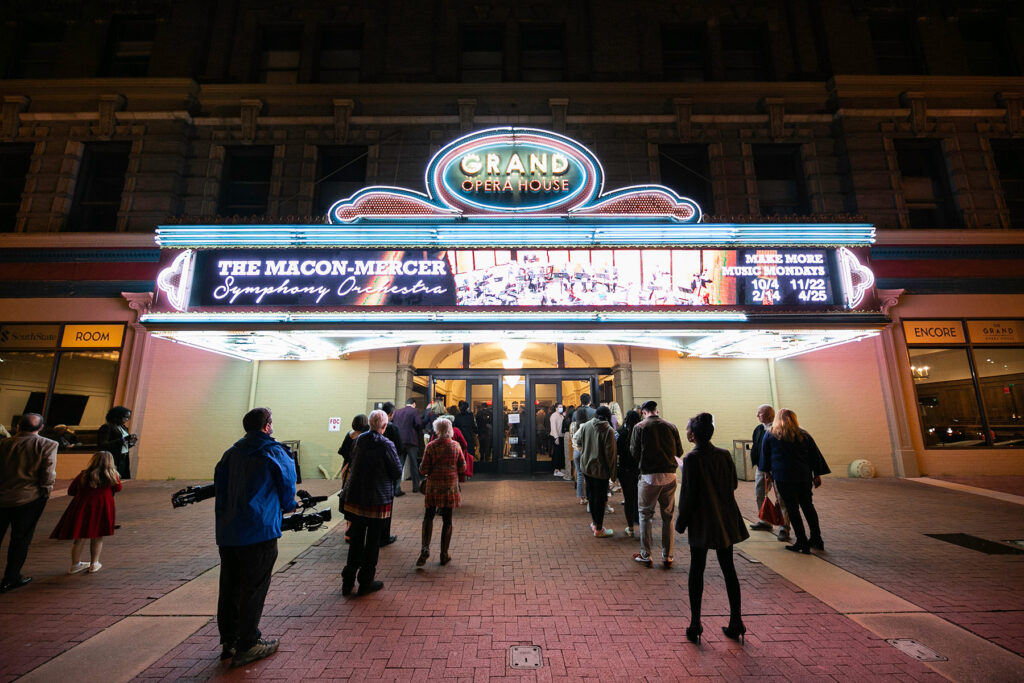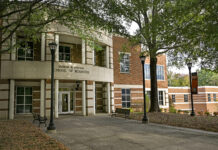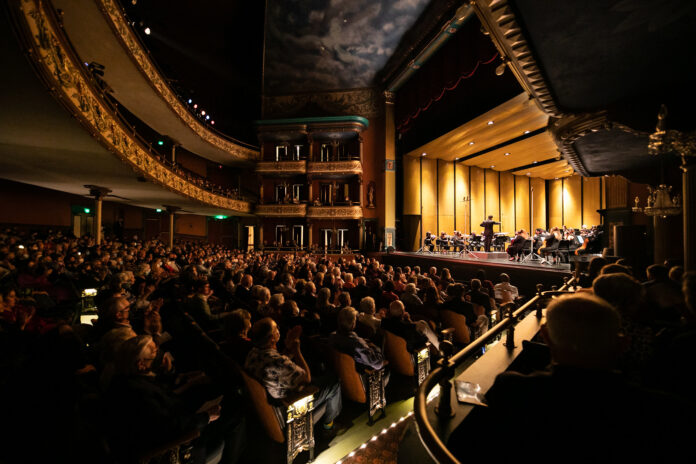
Across the country, symphony music has become difficult to produce, with several prominent orchestras closing. The Middle Georgia community knows this phenomenon all too well. The Macon Symphony Orchestra ceased operations in 2017, citing financial difficulties after over 40 years of concerts.

These challenges are well known in arts management. The population attending classical music events has declined over time, and those that attend are more likely to be older in age. Symphony is the most expensive type of classical music to produce, with dozens of highly skilled players on stage. When compared to watching a concert from a single virtuoso pianist or a chamber ensemble, the ticket prices are much more expensive.
For symphony orchestras to thrive, a disruption in the business model needs to reverse these trends. But how can one create a symphony orchestra that feels accessible and important to everyone in the community? And how can it become financially sustainable? Mercer University’s Robert McDuffie Center for Strings decided to answer the call and tackle this problem, aided by major funding from the Peyton Anderson Foundation.
The new Macon-Mercer Symphony Orchestra (MMSO) has been crafted to be a nimble 21st century orchestra, responding to Macon’s needs and providing invaluable performance experience for McDuffie Center students.
Combining professional, student musicians makes orchestra sustainable — and unique
The first issue was examining the cost of producing a symphony. The former Macon Symphony Orchestra brought in nearly all of its professional players from out of town, which added up not only in salaries but travel expenses.
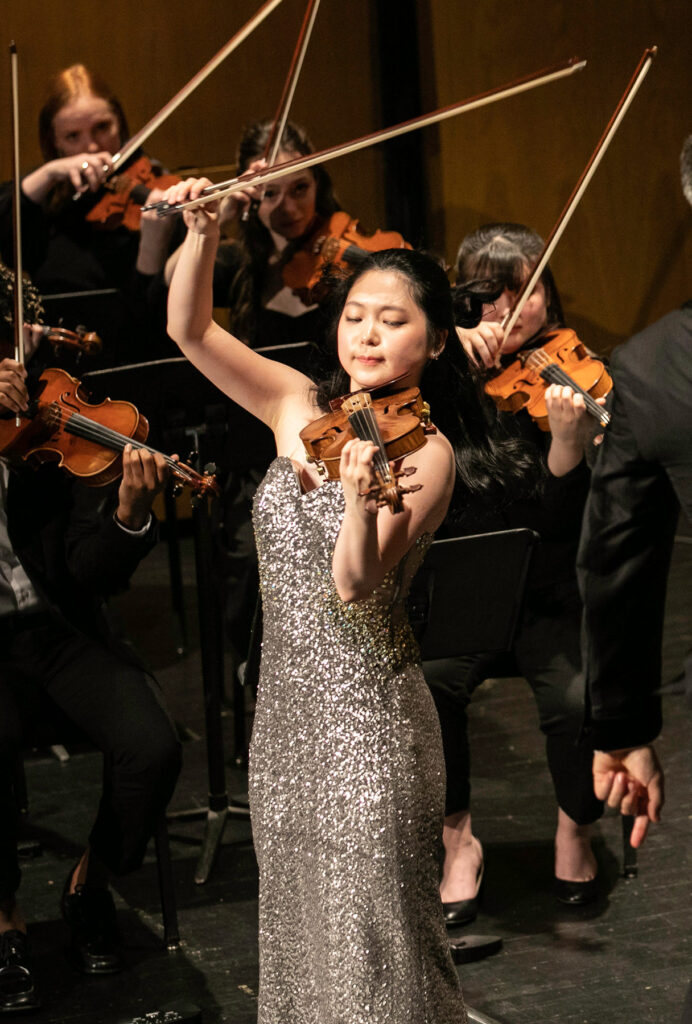
The new MMSO addresses this with an intergenerational experience. The strings section is made up of McDuffie Center students, including the concertmaster for each show. The orchestra is then filled out by principal players of the Atlanta Symphony Orchestra and McDuffie Center alumni, who act as orchestral mentors for the students.
This direct career experience has been a game-changer for Mercer students.
“It enables the students to rise to the next level,” McDuffie Center artistic director Amy Schwartz Moretti said. “It pushes them — at a faster pace — to a level of excellence in their individual practice. This opportunity is unparalleled.”
Added class of 2022 graduate Sara Scanlon: “This is the only place I know of doing this.”
Having principal players from a major orchestra is also an audience draw. McDuffie Center leaders made this work by uniquely situating all concerts on Monday evenings. Monday is typically a “dark” day for the performing arts, which stems from low attendance and is because many shows have both a matinee and an evening performance on weekends.
The Monday showtime allows for the MMSO to have an efficient travel structure, with musicians coming only 75 miles south from Atlanta. The Atlanta Symphony Orchestra mentors arrive and rehearse with students on Sunday evening, then have a technical rehearsal and performance the next day.
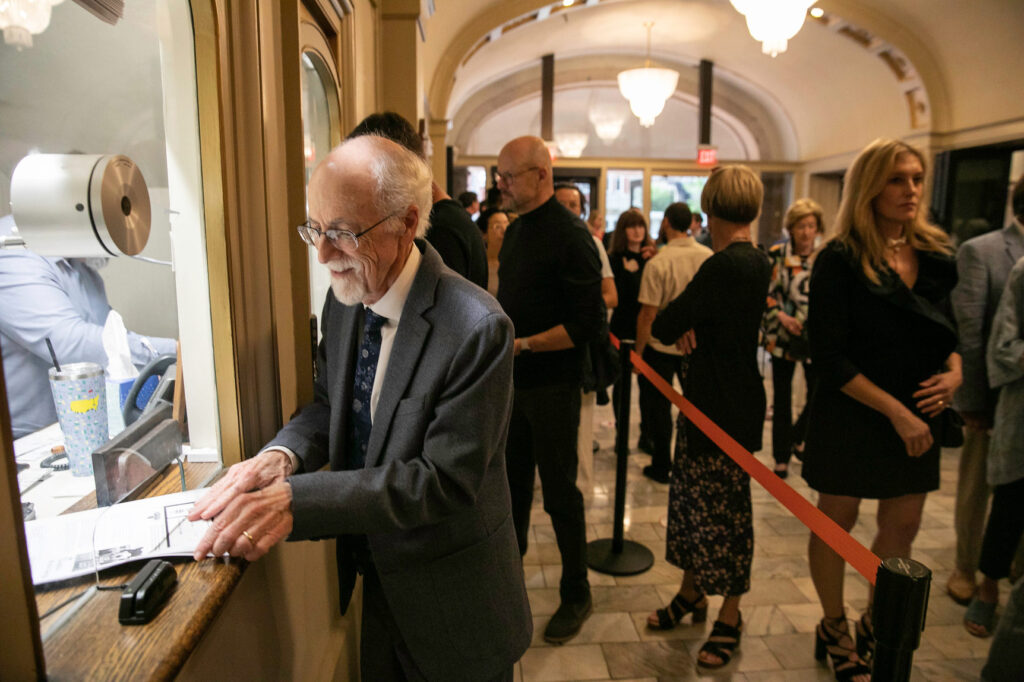
Programming shows audiences what symphony can do
The MMSO makes a dynamic, top-notch orchestra available in Macon. But once the musicians are gathered, what will they play? For the program, founder Robert McDuffie wanted to make the symphony seem relevant and exciting to the widest possible audience.
“We play the classics, the ‘dead European male composers,’ but we also branch out. People don’t always see how much symphonic music is used in real world contexts,” McDuffie said. From Haydn to hip-hop, the MMSO travels the musical spectrum in a single night.
This includes dynamic, cross-genre collaborations with renowned guest artists and organizations with hyperlocal ties to Middle Georgia. McDuffie specifically wants to invite a featured Black artist for each concert in order to mirror Macon’s population.
“This is a symphony I can get behind. I didn’t know what it would be like, and I’m hooked.”
Nancy Cleveland, former chair of the Young Patron’s Circle
The opening concert featured youth from Macon’s Otis Redding Foundation by arranging creations from their summer songwriting camp, and the students sang their own work live. In November 2021, Beulahland Gospel Choir joined the MMSO on stage for lively spirituals that had the audience clapping along. A Valentine’s Day concert brought rising-star composer and double bassist Xavier Foley to Macon, playing an original work inspired by the first slaves who arrived to Jamestown in 1619. The explosive finale highlighted Bob Lennon, a local hip-hop artist commissioned by the MMSO to premiere a new song, “Don’t You Look at Me.”
The innovation doesn’t stop there. The audience experience was crafted to be as inclusive as possible, removing traditional barriers that might make a potential patron think symphony isn’t for them.
“We want people to know it’s not a stuffy art form,” said class of 2022 graduate Allyson Cohen. To that end, audiences can enter late or clap whenever they’d like, dispensing with certain orchestra conventions, and symphony fashion can be black tie or casual.
“This is how symphony was in the time of Beethoven,” McDuffie said. “The ‘rules’ around how people watching should behave came way later.”
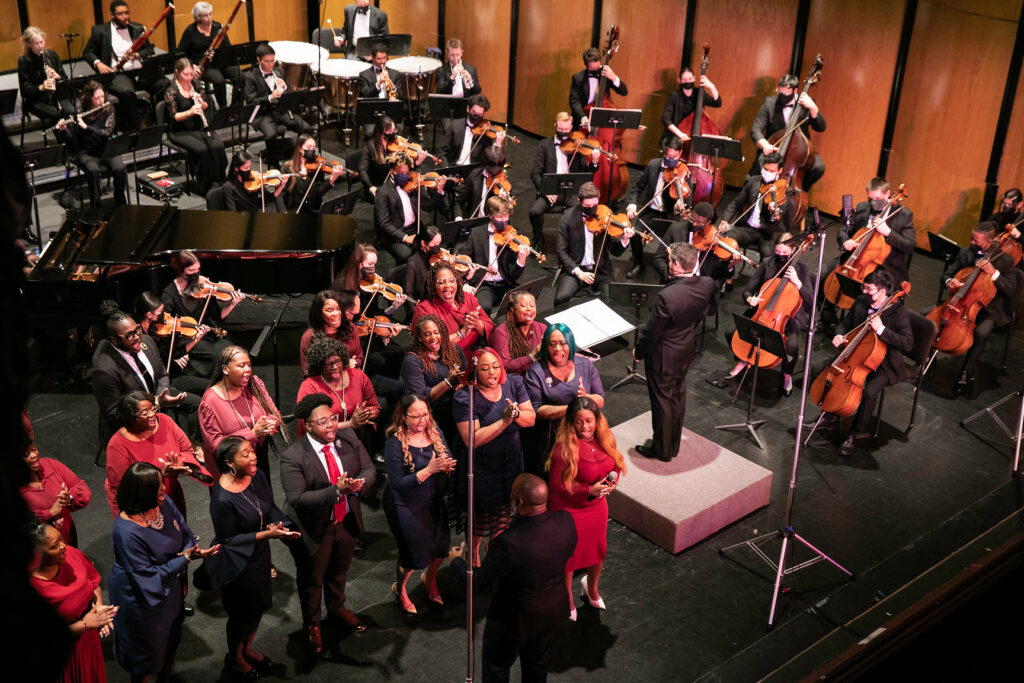
Seasons that smash expectations
On average, The Grand Opera House was over 90% filled to capacity for each concert for the first season — and these results were particularly surprising since audiences were just returning to live performing arts as COVID-19 restrictions lifted and because the concerts were held on Monday evenings.

The second season continued the expansion of the symphony, with more subscribers and additional revenue from the first season — more people were converted from complimentary tickets to being paying patrons.
“It was such a diverse audience — lots more young people and people of many ethnic backgrounds than at previous Macon Symphony shows. Really wonderful to see the WHOLE community enjoying the music,” wrote one patron in a post-show survey.
Another gushed: “The whole experience was wonderful — a symphony back in Macon, a full house, good numbers of young people in audience, extraordinary collaborative effort, community youth on program, musical selections, ASO musicians!”
“This is a symphony I can get behind. I didn’t know what it would be like, and I’m hooked,” said Nancy Cleveland, who chaired the Young Patron’s Circle last season.
The Young Patron’s Circle is a group of attendees under age 40 who come together to network and support the symphony orchestra. After just one season, there are over 80 members, and many brought companions to hear symphony for the first time.
Students from elementary schools to colleges have also been a robust part of the audience, making up over 10% of the house for each concert on average. One student organization traveled from as far as Dooly County, about 50 miles south of Macon, for the field trip.
The MMSO isn’t just getting new faces in the door. Support from traditional patrons was strong, with 350 subscribers for the inaugural season that increased to 390 (40% of the venue’s capacity) by the second season. The inaugural gala to support the symphony sold out over a month in advance and raised a six-figure sum for the orchestra’s future, with expanded gala seats requested for the next event. For these audiences, seeing symphony alive again and the audience filled is well worth their support.
“I congratulate the musicians and all of those who have supported the symphony’s spectacular first two years,” Mercer President William D. Underwood said. “The artistry and the repertoire have been outstanding, and I look forward to what future benefits the MMSO provides for our community.”
A symphony orchestra resembles a complex recipe. Many instruments and people need to melt together as one to create an enjoyable sound. With the Macon-Mercer Symphony Orchestra, it seems the ingredients have mixed together in harmony with the Middle Georgia community — just right for the taste of success.
